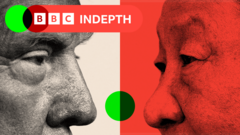
US-China Relations in the Spotlight: Trump’s Potential Return
As Donald Trump potentially prepares for a second presidential term, the complex relationship between the United States and China stands at a critical juncture. The article explores the potential implications of Trump’s return, set against the backdrop of Beijing’s evolving global ambitions.
In Beijing, the mood is a mix of concern and cautious preparation. Local residents, like pensioners exercising near the Temple of Heaven, reflect on China’s remarkable economic transformation while expressing mixed feelings about Trump. One 74-year-old participant notes Trump’s unpredictability, saying, “I like Trump, but he’s unstable. Who knows what he might do?”
Trump’s cabinet selections, including Marco Rubio and Mike Waltz, signal a potentially more aggressive approach towards China. Experts suggest the administration may adopt a muscular policy targeting China’s economic and military expansion. The competition between the two nations has intensified, with tensions spanning trade, technology, and geopolitical influence.
Key areas of potential conflict include:
1. Trade and Tariffs: Trump has proposed 60% tariffs on Chinese-made goods, which could significantly impact China’s export-driven economy. However, Beijing has been preparing, diversifying agricultural imports and exploring alternative export markets.
2. Military and Nuclear Capabilities: China is demonstrating military strength, showcasing advanced stealth fighters and potentially developing nuclear-powered aircraft carriers. This has raised concerns in Washington about a potential nuclear arms race.
3. Taiwan: The island remains a critical flashpoint, with China asserting territorial claims and the US maintaining its commitment to Taiwan’s defense.
Despite their differences, both Trump and Chinese President Xi Jinping share a similar nationalist rhetoric. Xi seeks the “great rejuvenation of the Chinese nation,” while Trump promises to “make America great again.”
China currently faces significant economic challenges, including a sluggish economy, a struggling property sector, and high youth unemployment. These issues could potentially influence the country’s strategic approach to international relations.
Interestingly, Beijing sees Trump’s potential return as an opportunity. His “America First” doctrine previously weakened US alliances in Asia, which could benefit China’s global positioning. Chinese leaders are likely to portray the US as a source of global instability while presenting China as a responsible world power.
A local perspective at the Temple of Heaven captures this sentiment perfectly. One man remarked, “He’s only got four years. The US is always changing leaders. In China, we have more time.” This reflects the long-term strategic thinking of Chinese leadership, with Xi potentially positioned to lead for life.
The article suggests that while tensions between the US and China are likely to continue, both nations will navigate a complex diplomatic landscape. The relationship will be characterized by competition, occasional cooperation, and a delicate balance of economic and geopolitical interests.








